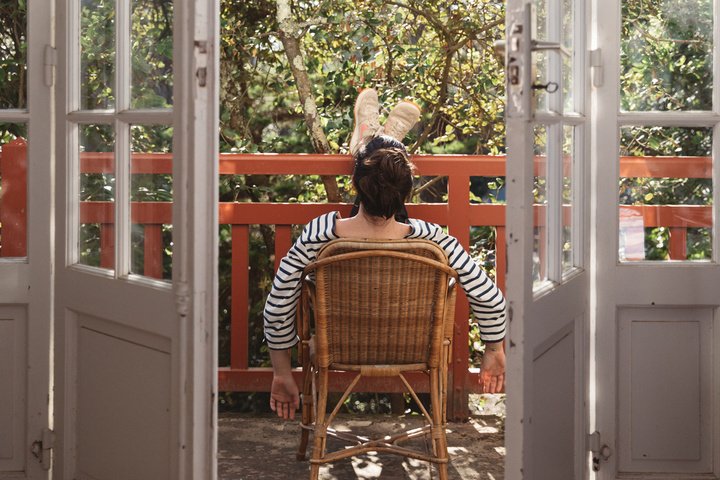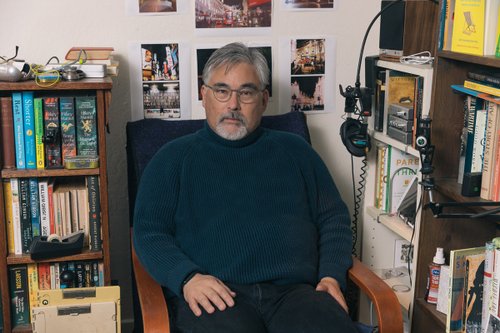Why we need to stop talking about productivity
Apr 30, 2020
5 mins


Investigative journalist
A view from my desk: In this series of personal essays, discover the questions and thoughts from the world of work that keep our writers up at night.
The world wants you to take a break. Lockdown is not the time to gun for a promotion, work on your side hustle, or start that small business you’ve spent years fantasizing about at your desk. Now is the time for us to realize our obsession with professional productivity is a dangerous addiction that must be treated rather than fed.
That the cessation of business as usual has soothed the physical manifestations of anxiety in the world we call home seems a pretty clear indication there is nothing natural in the way we have been living our lives until now.
At the start of April, two weeks into the first lockdown, British seismologists reported that the sudden and drastic reduction in human activity had caused the air we breathe to vibrate 25% less than usual. Amid the often alienating and overwhelming tide of information about the pandemic, I found this particular piece of news strangely relatable.
Two years ago, midway through my 28th year on Earth, I had my first session with a psychotherapist, with whose help I came to realize I had spent the best part of a decade in a near-constant state of anxiety. Throughout those ten preceding years, people would comment on how my hands never seemed to stop shaking. I would laugh and dismiss the tremors as “just something my hands do”. Therapy helped me understand that when your body sends you these signals, it’s trying to alert you to something important. I can’t help but feel the seismologists are receiving a similarly coded message from our planet.
That the cessation of business as usual soothes the physical manifestations of anxiety in the world we call home seems a pretty clear indication there is nothing natural in the way we have been living our lives until now.
There is a general sense that not using a lockdown productively goes against our naturally industrious natures. Of course, there is nothing natural to our industry.
One hour commutes to work, one hour back, Amazon trucks rumbling up to our front doors, passenger jets groaning through the sky laden with middlemen heading to meetings to secure commissions on the sale of digital advertising space. None of the available data—ice caps receding six times as fast as 30 years ago, one million species threatened with extinction, soaring suicide rates—point to all this activity being healthy, or even sustainable.
Yet again, social media is abuzz with people “going crazy” with “nothing to do” or “feeling guilty” for “not doing anything”. There is a general sense that not using a lockdown productively goes against our naturally industrious natures. Of course, there is nothing natural to our industry.
For the vast majority of human history, we worked very little. Writing in 1992, American sociology professor Juliet Schor calculated that peasants in medieval England worked an enviable 120 days a year. Citing contemporary accounts, she argued that, when they did work, their working day was far more relaxed than anything we are now accustomed to: a long lie-in followed by breakfast before picking up tools, a lunchtime nap, and no chance of overtime at the end of the day.
“And when his hour cometh at night, at the first stroke of the clock he casteth down his tools, leaveth his work, in what need or case soever the work standeth,” the Bishop of Durham wrote of peasant laborers in 1570, according to Schor.
If a life of leisure once came so naturally to us, why can’t we be content in our idleness today?
What was once a piece of fringe theology has come to be viewed as innately true—on some gut level most of us equate hard work with good character.
The answer probably lies in what Max Weber coined the Protestant work ethic in 1905: the idea that your earthly wealth was evidence that God had chosen you to join him in heaven when you die. Since the fastest way of acquiring wealth without violating the Ten Commandments was through hard work, it followed that God’s chosen ones would be hard workers. If you loved God you loved a long day at the spinning wheel.
Fast forward to the 21st century and few of us had heaven on our brains as we trampled over our natural circadian rhythms to wake with our 6 AM alarm clock rather than the rising of the sun. What was once a piece of fringe theology has come to be viewed as innately true—on some gut level most of us equate hard work with good character.
“He’s a good guy, a hard worker,” we say, without questioning how we came to view spending 40-plus hours a week sending emails under strip lighting as inherently virtuous.
In 2013, researchers at the University of Groningen in the Netherlands put Weber’s theory to the test. Amassing a sample of 150,000 individuals from 82 societies across the world, they wanted to establish whether hailing from a historically Protestant society did in fact boost one’s work ethic.
They did this by assessing the impact unemployment—that is, the absence of work—had on an individual’s sense of well-being. They found that people living in Protestant societies feel measurably worse when they are out of work than those from non-Protestant countries.
This should be quite comforting if you’re sitting at home, foot tapping nervously against the floor like a junkie aching for a fix, quietly losing your mind at the thought of how idly and unprofitably you’re spending the lockdown.
Certainly, the fastest way to make that spiritual angst evaporate would be to find a side hustle (freelance marketing copywriter for face mask factories on Aliexpress.com, perhaps? It’s certainly a growth market) or lay the groundwork for your post-corona promotion by hitting your boss up for some extra homework.
But in doing so you are feeding a beast whose belly will never be filled. Where does it end? Will 2040 be the year you beat yourself up for not using your decadently dream-filled sleep to brainstorm ideas for small businesses?
Instead, at this moment when nature itself is screaming at us to slow down, perhaps it’s time to cast a lovingly critical eye at the beast, rather than trying to placate it with snacks of productivity.
I spent years trying to bury my anxiety under ceaseless activity. At the start of my 20s, I was working 100-hour weeks for a company that produced disposable sales materials for high street shops. It was soulless and existentially useless work, but I looked down on my friends and acquaintances who put in a pitiful eight hours a day—one day they would learn the meaning of hard work, I thought. With hindsight, I suspect those friends were just making a less frenzied attempt to hide from the inside of their own heads.
In therapy, I learned that while it is far easier at the moment to bury anxiety under activity, it doesn’t go away. The trick, my therapist taught me, is to sit with that feeling. Allow it to exist. Observe it. Understand it, like you would a crying child. Before long you’ll see that it has no power to do you harm if you won’t let it.
Likewise, rather than immediately burying under activity the creeping guilt, anxiety, and dread that rises up when you think of how unproductively you’re spending lockdown, sit with those feelings. Ask yourself whether there really is anything to be guilty about in just putting your feet up and daydreaming for a little while. Ask whether maybe the world might be a better place if more of us did.
There was a meme circulating when this started; it said we’ve all been naughty and the coronavirus has sent us to our rooms. In reality, coronavirus is not sentient, and it has no benevolent purpose among us. But in a universe where the deadliest pandemic for decades has been sent to teach us a lesson, we are not naughty—we’re addicts and intervention is being staged.
Photo: Welcome to the Jungle
Follow Welcome to the Jungle on Facebook, LinkedIn, and Instagram, and subscribe to our newsletter to get our latest articles every day!

More inspiration: Inspiration for workers

From hobby to side hustle: 10 steps to turn your passion into a career in 2025
Have you been waiting for the right moment to turn what you love into a paid gig? 2025 is your time!
Dec 18, 2024

Patience, balance, and multitasking: How parenthood shaped my career
Parenthood changes everything—including your career. These working parents share exactly how.
Dec 11, 2024

The traits of a great boss (and how they make your work life better)
What makes a great boss? Effective leaders do more than manage tasks—they create a workplace where people feel supported, encouraged, and inspired.
Nov 13, 2024

Leading without limits: How to shine as a leader, title or no title
Lab expert Ginny Clarke explores how being a leader isn't just reserved for execs ...
Apr 09, 2024

How our burnt-out society can finally get some rest
Alex Soojung-Kim Pang unveils transformative strategies for slowing down our fast-paced lives.
Mar 19, 2024
The newsletter that does the job
Want to keep up with the latest articles? Twice a week you can receive stories, jobs, and tips in your inbox.

Looking for your next job?
Over 200,000 people have found a job with Welcome to the Jungle.
Explore jobs